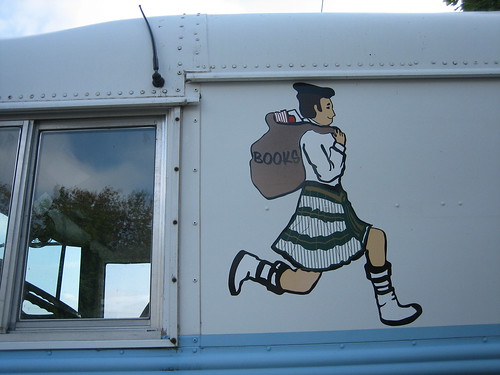My talk went well. It was scary (keynote!), early (8:30!), and multimedia (slides, video, me doing the blah blah part). I have this problem basically not being able to remember a thing I said after I get off the microphone BUT this time I wrote the talk out first, and this time I think it was even recorded. I’ll keep you posted on that. Here are my slides, notes and some more links. Thanks to everyone who paid close attention, blogged about it, and/or laughed at my jokes, and thanks to the conference planners for inviting me and encouraging me to make the trip.
off to Access
I’m heading out of Boston this morning to go to Victoria and speak tomorrow at Access2007. From there I’ll be going to NELA in Sturbridge MA where I’ll be giving a few talks. Please say hi if you see me in the subway, airport, bus, ferry, hotel, helijet, library, or just wandering around somewhere.
(mostly) fully clothed women reading
Lezende Vrouwen in de Kunst (women reading, in artworks). The site is in Dutch but you can just click across the century links up top. From the always excellent BibliOdyssey.
librarian.net is rocking wordpress 2.3
Hi. I upgraded to WordPress 2.3 today because I just noticed a bug in the tagging plug-in I was using which means that any time I approved a comment for a particular post, the tags associated with that post vanished. Pretty weird huh? WordPress 2.3 has native tag support which means no more wonky plugin/WP interactions. It also has — hidden in the manage > import > section — a tag importer that will either import your tags from popular tag plugins or import your categories as tags. This is all good news. I managed to do the entire thing in about 20 minutes including adding tags to my current template, adding the tag cloud, downloading new versions of a few other plug-ins, and re-doing the little hacks I always make to my WordPress install including a custom stylesheet, removal of all the extra cruft from the dashboard, and pulling in a del.icio.us feed of the “addme” tag into my now blank dashboard area. Here are a few links that were helpful to me in doing this upgrade
bookmobiles — dying out?
It’s Banned Books Week and I’ve been discussing issues of access. Today the Boston Globe has this alternatingly irritating and sweet article this week Bookmobiles’ final chapter?. Forgetting for a moment that they broke the cardinal rule of using dippy headlines to downplay whatever seriousness the article might have had, this story talks about the demise of the bookmobile at the same time as it reports on the Beverly Public Library’s fundraising attempts to buy a new one. It seems, again, like a reporter has decided on the article they wish to write before actually learning about the topic and if I were the Beverly Public Library I’d be pretty annoyed that this article frames the bookmobile idea as something from a bygone era. The article doesn’t even have the wherewithall to cite any actual data preferring to allude to experts saying “Some blame skyrocketing gas prices. Others say bookmobiles became irrelevant in communities where residents can get easy access to other resources, such as the Internet.” The caption of the photo even puts the word “Bookmobile” in quotes as if it’s some weird made-up library word.
Do people really think that the Internet is replacing the bookmobile? I’d be much more inclined to think that increasingly mobile patrons and the increase of decent school libraries has done more for making the bookmobile less needed. We still have bookmobiles, part of the year, in rural communities here. Heck we have a mobile DMV vehicle that comes to remote towns to help people register their cars. Not everyone can drive the 45 minutes from here to the DMV, particularly if their car isn’t registered. The ALA is the voice of reason in this article, with Satia Orange quoted as saying “There are communities where bookmobiles are the primary place to get information, in rural areas where getting to a library is difficult or a low-income area where computers are not in every home, where people cannot afford to buy books.” Let’s keep in mind that if you’re rural enough to not have a nearby library you probably also don’t have nearby broadband.
